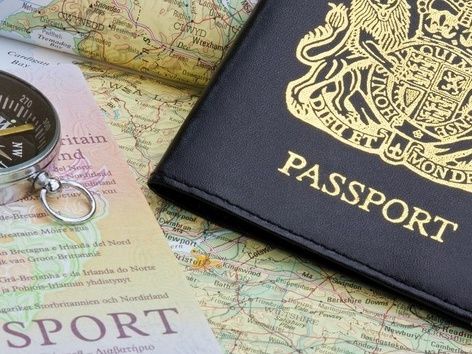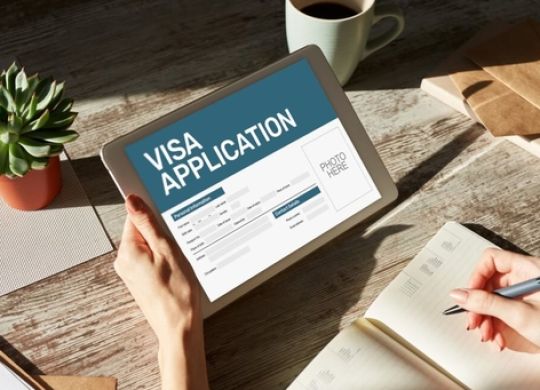How to Apply for Ireland Working Visa from Nepal in 2025?
Table of contents

If you are from Nepal and planning to work in Ireland in 2025, find out what permits you need, how to apply and what to consider for successful employment
If you are a Nepali citizen and plan to work in Ireland, you will need to obtain a work permit from the Irish Immigration Service Delivery. In addition, as a non-EU/EEA citizen, you are also required to apply for a work visa to Ireland to be allowed to enter the country for the purpose of employment.
How to apply for a work visa to Ireland from Nepal in 2025? Read this article.
Choose a reliable health insurance policy on the Visit World portal to protect yourself from unforeseen expenses during your move. Support from a trusted insurance agent with a guaranteed payout in just a couple of clicks!
Types of Work Permits in Ireland
There are several types of work permits in Ireland. The most common of these are the Critical Skills Permit and the General Work Permit.
Critical Skills Employment Permit
Designed for highly skilled professionals, including in the following fields:
- IT, engineering, medicine, pharmaceuticals
- science, education, architecture, business
- media, sports, design, marketing
Benefits:
- High pay (from €38,000–€64,000/year)
- Simplified procedure (no labor market test)
- Faster obtaining of PMP and possibility of reunification with family
General Employment Permit
Suitable for other professions not included in the list of critical skills.
Requirements:
- Minimum salary: from €30,000/year
- Cannot work in restricted industries (there is a special list)
- Labor market test required
Permit for dependents, spouses and partners
Issued to relatives of the holder of a critical skills permit.
Benefits:
- You can work in any field (except home work).
- Application – free of charge.
Other types of permits
- Intra-corporate transfer – for employees who are transferred to the Irish office of the company.
- Internship – for international students who want to do an internship in Ireland (up to 12 months).
- Contract services – for employees of foreign companies working under contract in Ireland.
- Sports and culture – for professionals who contribute to the development of these areas in Ireland.
- Exchange agreements – for participants in international programs (Fulbright, IAESTE, AIESEC).
- Reactivation of the permit – for those who have lost the right to work through no fault of their own (for example, due to exploitation).
Basic requirements for obtaining a work permit in Ireland
To obtain a work permit, you must meet the following conditions:
- A job offer or contract from an Irish employer is mandatory.
- Minimum salary: from €30,000/year - for most permits, from €38,000 or €64,000/year - for critical skills permits (depending on the profession).
- For other types - not lower than the national minimum wage.
- Labor Market Needs Test - mandatory if you are not applying for critical skills.
Documents for applying for a work permit
When completing the online application (via the EPOS system), you need to prepare the following documents:
- Passport (copy of the first page with photo, signature and data).
- Passport-sized photograph (in accordance with Irish requirements).
- Employment contract signed by you and your employer.
- Immigration stamp (if you are already in Ireland).
- Company contact: name, position, phone, email.
- Company information: registration number, address, name, license or PIN code (if required).
- Employment conditions: salary, job description and duration of employment.
- Letter of support from IDA or Enterprise Ireland (if required).
Important! The list of documents may vary depending on the type of permit.
How to apply for a work permit in Ireland
Both the employee and the employer can apply. All applications are submitted online through the Employment Permit Online (EPO) system.
Step 1: Register and select the type of permit
After starting to fill in, you will receive a MyWork-ID, which allows you to save your progress and return to the application.
The application must be completed within 28 days.
If you do not know which permit is right for you, the system will help you choose the correct form.
Step 2: Fill in the application
The form must indicate:
- Personal details
- Employment information
- Contract details, salary, responsibilities
- Employer details
- Information about redundancy (if any)
The application can be filled in in stages, saved and edited.
Step 3: Upload documents
Upload all necessary documents in PDF, JPG, PNG formats (up to 10 MB). Some forms need to be printed, signed and re-scanned for uploading.
Step 4: Pay the fee
Payment is made online using a credit card.
The fee depends on the type of permit (see section above).
Step 5: Wait for processing
The average processing time for an application is up to 13 weeks.
Once you have received your permit, you can apply to enter Ireland and upon arrival, register with the National Immigration Bureau (GNIB).
Once you have received your permit: what next?
Once your work permit is approved:
- At the Irish border, your passport will be stamped with the length of your stay.
- If you plan to stay for more than 90 days, you must register with the Garda National Immigration Bureau (GNIB).
- Once you have registered, you will receive an Irish Residence Permit (IRP).
Can I change employers in Ireland?
Yes, but only after you have worked for your original employer for at least 12 months. You can then look for a new job and apply for a new permit if the position is similar or in a relevant field.
Can I bring my family to Ireland?
Yes, family (spouse, partners, dependents) can be invited to Ireland on a family reunification visa if you have been legally resident in Ireland for at least a year.
Obtaining a work permit in Ireland is an important step for Nepalese citizens who plan to work and live in this country. The process involves choosing the right type of permit, collecting the necessary documents, applying through the online system and following all the requirements and deadlines. Once the permit is issued, you will be able to work legally, join your family and fully integrate into Irish society.
To avoid mistakes, delays and simplify the procedure as much as possible, we recommend contacting professional immigration lawyers. They will help you choose the optimal type of permit, competently prepare documents, support you at all stages of the application process and provide advice on immigration rights and obligations in Ireland.
Reminder! The new work permit application system in Ireland has replaced the current EPOS portal with a new online portal, which will facilitate the application process. We have already told you what has changed in the application process, in particular, the need for user registration, improved security, as well as new features for tracking the status of applications and electronic signature.
Products from Visit World for a comfortable trip:
Checklist for obtaining a visa and necessary documents in Ireland;
Legal advice on immigration to Ireland;
Travel insurance for foreigners in Ireland;
Medical insurance all over the world.
Frequantly
asked questions
Does a Nepalese citizen need a work visa to enter Ireland?
How long does it take to process an application for a work permit in Ireland?
Can I apply myself or does my employer have to do it?
Recommended articles
2 min
Expats
Luxembourg visa requirements for Nepalese nationals in 2025: new rules, visa types and documents
Luxembourg is a country with a rich history, architectural beauty, cultural heritage, as well as a developed economy and political stability. Therefore, it is not surprising that the state has become an attractive destination for many foreigners wishing to visit the country for work or study. Read more about Luxembourg visa requirements for Nepalese nationals
21 Jun. 2025
More details2 min
Employment
TOP-20 most in-demand professions in Ireland for foreigners in 2024: current list
Ireland is currently experiencing an acute shortage of personnel in 20 professions in healthcare, IT, engineering, manufacturing, and construction. Find out more about which professions will be the easiest to obtain a work visa in Ireland in 2024
08 Aug. 2024
More details3 min
Travels
Top 10 must-see places in Ireland
Ireland attracts millions of tourists from all over the world with its ancient haunted castles, luxurious mansions, emerald meadows with sheep, rocky cliffs, and cheerful, noisy pubs. It's easy to get lost in such a variety of attractions. Learn more about the top 10 must-see places in Ireland for tourists
08 Aug. 2024
More details1 min
Employment
If you want to work in Ireland, you need a work permit issued by the Department of Enterprise, Trade and Employment (DETE). Given the shortage of workers currently observed in the country, local authorities have significantly simplified the procedure for obtaining a permit. Find out what has changed for expats in Ireland since 2 September
02 Sep. 2024
More detailsAll materials and articles are owned by VisitWorld.Today and are protected by international intellectual property regulations. When using materials, approval from VisitWorld.Today is required.
